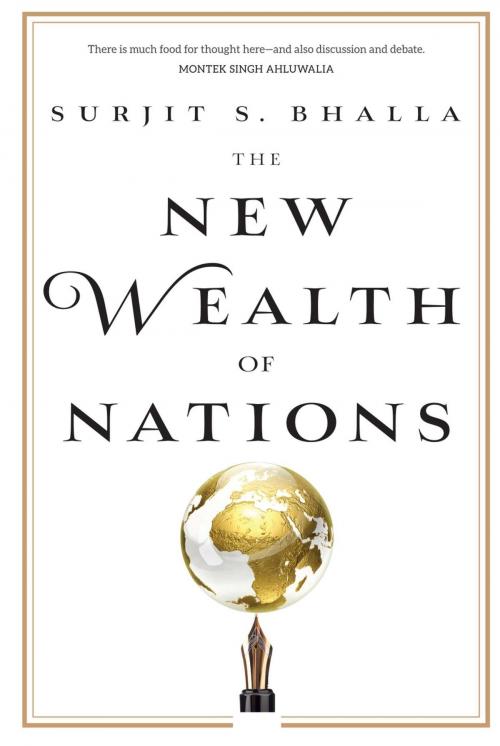| Author: | Surjit S. Bhalla | ISBN: | 9789386797032 |
| Publisher: | S&S India | Publication: | November 23, 2017 |
| Imprint: | S&S India | Language: | English |
| Author: | Surjit S. Bhalla |
| ISBN: | 9789386797032 |
| Publisher: | S&S India |
| Publication: | November 23, 2017 |
| Imprint: | S&S India |
| Language: | English |
The emerging world was poor and illiterate just forty years ago. Today, over 70 per cent of the world’s middle class resides in the erstwhile poor countries; world income inequality is down to levels last observed in 1870; and there has been a large reduction in absolute poverty. What accounts for such rapid development and catch-up? Distinguished economist Surjit S. Bhalla’s The New Wealth of Nations offers a short answer—the spread of education.
The very large increase in college graduates in the non-Western world, the growing educational achievements of women, and the radical change in gender roles is critical to the understanding of current-day mega-trends. Indeed, this unprecedented development—which creates competition globally and lowers employment costs—is also why world inflation has been low, and declining, for nearly twenty years.
Here is a book that breaks new ground. Besides identifying the fallacies in anti-globalization rhetoric—voiced by Brexit and Trump supporters—it points out a major lacuna in current attempts to measure wealth inequality. Through a series of compelling arguments, anecdotes, studies, calculations, tables, and charts, Bhalla emphatically reminds us that education is the new wealth, and is, in fact, currently of a greater magnitude than financial wealth, and much more equally distributed.
Even while acknowledging the giant strides made by the developing world, The New Wealth of Nations investigates the downsides to the explosion of education and technology, and why countries, rich and emerging, will have to explore options like basic income and negative income tax, so that a new welfare order, appropriate for the changed—and changing—21st century can emerge.
* Surjit S. Bhalla has been recently appointed as a member of PM Modi’s Economic Advisory Council, and his new work is a ground-breaking achievement that argues for a new welfare order across nations which is better suited for the constantly transforming time we live in.
* Through a series of compelling arguments, anecdotes, studies, calculations, tables, and charts, noted economist Surjit S. Bhalla establishes in his latest book that education is the new wealth of nations.
* This book offers insights into the definitions of the poor, the middle class, and the rich, while relating each of these to advances in schooling attainment. It explores the economic reasons behind the political success of globalization in the Western world till the early 2000s, and now its fall from grace in these same countries as notably evidenced by Brexit and the rise of Donald Trump.
The emerging world was poor and illiterate just forty years ago. Today, over 70 per cent of the world’s middle class resides in the erstwhile poor countries; world income inequality is down to levels last observed in 1870; and there has been a large reduction in absolute poverty. What accounts for such rapid development and catch-up? Distinguished economist Surjit S. Bhalla’s The New Wealth of Nations offers a short answer—the spread of education.
The very large increase in college graduates in the non-Western world, the growing educational achievements of women, and the radical change in gender roles is critical to the understanding of current-day mega-trends. Indeed, this unprecedented development—which creates competition globally and lowers employment costs—is also why world inflation has been low, and declining, for nearly twenty years.
Here is a book that breaks new ground. Besides identifying the fallacies in anti-globalization rhetoric—voiced by Brexit and Trump supporters—it points out a major lacuna in current attempts to measure wealth inequality. Through a series of compelling arguments, anecdotes, studies, calculations, tables, and charts, Bhalla emphatically reminds us that education is the new wealth, and is, in fact, currently of a greater magnitude than financial wealth, and much more equally distributed.
Even while acknowledging the giant strides made by the developing world, The New Wealth of Nations investigates the downsides to the explosion of education and technology, and why countries, rich and emerging, will have to explore options like basic income and negative income tax, so that a new welfare order, appropriate for the changed—and changing—21st century can emerge.
* Surjit S. Bhalla has been recently appointed as a member of PM Modi’s Economic Advisory Council, and his new work is a ground-breaking achievement that argues for a new welfare order across nations which is better suited for the constantly transforming time we live in.
* Through a series of compelling arguments, anecdotes, studies, calculations, tables, and charts, noted economist Surjit S. Bhalla establishes in his latest book that education is the new wealth of nations.
* This book offers insights into the definitions of the poor, the middle class, and the rich, while relating each of these to advances in schooling attainment. It explores the economic reasons behind the political success of globalization in the Western world till the early 2000s, and now its fall from grace in these same countries as notably evidenced by Brexit and the rise of Donald Trump.















